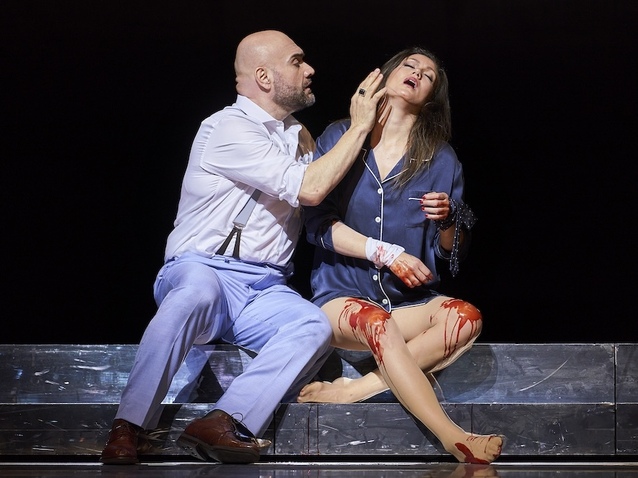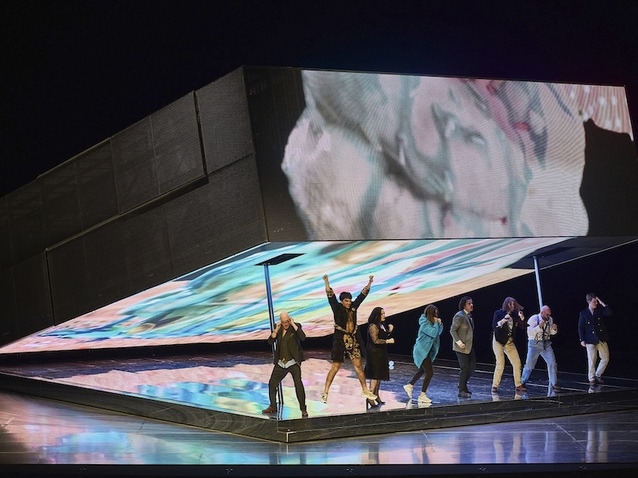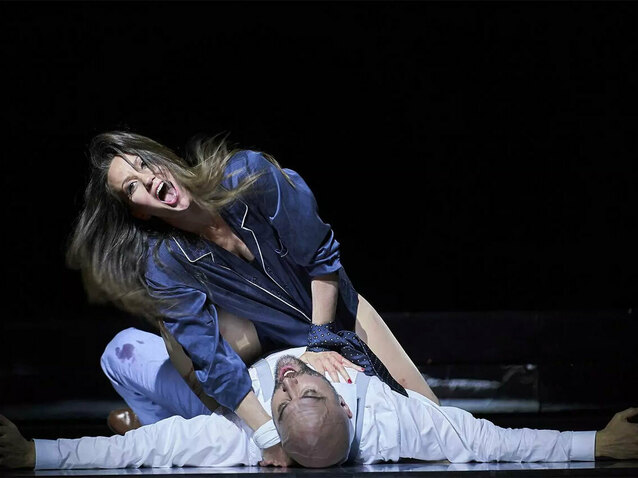 © David Ruano / Gran Teatre del Liceu
© David Ruano / Gran Teatre del Liceu
In the program booklet, Calixto Bieito stated regarding his work as stage director of Giulio Cesare in Egitto at the Liceu that “the best lie is the truth,” referring to the fact that he does not judge but merely presents the grotesque absurdities of the real world with clarity, and does so through opera—if anyone is to learn something from it, let them do so. Applied to Giulio Cesare, this means presenting the characters as an extravagant tribe of super-millionaires people who, in the artificial setting of a ‘hi-tech’ paradise, are essentially devoted to destroying one another, where sex, betrayal, manipulation, distortion, deception, humiliation, violence, and cruelty are the paths to power, which is conceived as the ultimate good.
In the second part, the stage displayed an impressive set design by Rebecca Ringst that recalled the Saudi Arabian pavilion at Expo 2020 in Dubai—a building that, among many other things, was also a shameless and exorbitant display of economic power. That all the characters end the opera seated on golden toilets, the supreme exaltation of the powerful’s kitsch, is a whole declaration of intent.
Twenty-five years ago, Bieito filled the Liceu stage with toilets in his version of Un ballo in maschera, which caused a monumental scandal—one of the greatest in the Liceu’s history. Now, in a self-homage (or parody? or revenge?), he has filled it with toilets again and no one has protested. Indeed, the best lie is the truth.

Giulio Cesare in Egitto - Gran Teatre del Liceu Barcelona (2025) (c) David Ruano
Within the “incomparable setting” offered by the scenography, Bieito’s intentions regarding his characters sometimes worked and sometimes didn’t. Giulio Cesare is very long; the opera’s numerous arias all follow the da capo structure (and the musical direction didn’t spare us a single one). The da capo is often (and was again this time) the torment of stage directors, who use up all their theatrical ammunition in the first section and then don’t know what to do with the singers during the repeat, other than having them repeat what they’ve already done. In this respect, Giulio Cesare was at times tedious.
The stage direction worked much better, for example, in the magnificent job Bieito did two years ago with L’incoronazione di Poppea than it did now with this Giulio Cesare, presented as a co-production with Dutch National Opera and previously seen in Amsterdam in January 2023.
Musically, the premiere improved steadily and ended very well. The orchestral direction was led by William Christie, a major figure in the Baroque world, and the Liceu Orchestra—reinforced at key points by players from Les Arts Florissants (Christie’s ensemble)—was playing for the first time in its history with period instruments, tuning, and historically informed criteria. Turning the Liceu Orchestra into a “Baroque orchestra” was no easy feat; the start was uncertain, but soon the musicians began listening to one another, the sound took shape, and a high orchestral level was eventually reached.

Giulio Cesare in Egitto - Gran Teatre del Liceu Barcelona (2025) (c) David Ruano
The vocal beginning was also uncertain. Xavier Sabata struggled with his first and fearsome aria, “Presti omai l’egizia terra,” which Handel wrote for the formidable abilities of the famous castrato Senesino, and which catches the singer completely cold. Sabata’s Cesare, scenically imposing, grew musically as the work progressed and especially in the second part reached near excellence.
Julie Fuchs delivered a Cleopatra of the highest level, both scenically and vocally. She introduced some stylistically questionable variations in the da capo of “Piangerò la sorte mia,” which may not have been musically relevant but fit the character’s debauched nature. Fuchs, who had already participated in the Amsterdam premiere of this production, drew on that experience to enrich her portrayal of a sexy, unscrupulous Cleopatra who uses her beauty to manipulate everyone.
Teresa Iervolino played Cornelia, the widow of the beheaded Pompeo, who is harassed by everyone. The stage direction demanded a lot from her—perhaps too much—and she was inconsistent at first (when, confronted with her husband’s head, she turned into a kind of vaguely cannibalistic zombie), but she improved significantly throughout her difficult and numerous appearances. Cameron Shahbazi was also strong as Tolomeo, perhaps he could have shone a bit more vocally, as the score allowed it, but scenically he could not have been more depraved and perverse without descending into caricature.
Sesto, Pompeo’s son, who has a twisted, textbook-psychoanalyst relationship with his mother, was sung by Helen Charlston. Her voice is powerful, but it sounded uncontrolled, with changes in tone and dynamics that were wholly inappropriate.
José Antonio López was solid as Achilla, the general who first betrays the Romans, then the Egyptians, and finally, in articulo mortis, in a plot twist not even Handel himself would believe, precipitates the story’s conclusion.
Alberto Miguélez Rouco was competent but not particularly brilliant as Nireno, Cleopatra’s confidant, and Jan Antem was good as Curio. The opera’s brief choral parts were taken on collectively by the soloists.
Xavier Pujol
Barcelona, 25th May 2025
Giulio Cesare by Handel. Xavier Sabata, countertenor. Jan Antem, baritone. Teresa Iervolino, mezzo-soprano, Helen Charlston, mezzo-soprano. Julie Fuchs, soprano. Cameron Shahbazi, countertenor. José Antonio López, baritone. Alberto Miguélez Rouco, countertenor. Orchestra of Gran Teatre del Liceu. William Christie, conductor. Calixto Bieito, stage director. Astrid van den Akker, restaging. Bettina Auer, dramaturgy. Rebecca Ringst, scenography. Ingo Kruegler, costumes. Michael Bauer, lighting. Sarah Derendinger, video. Production by Gran Teatre del Liceu and Dutch National Opera.
the 27 of May, 2025 | Print
Comments